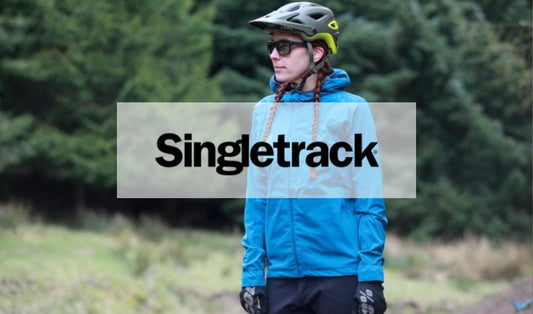


A tad over-exuberant to be back in the hills, I legged it up Black Sails ridge faster than I meant to. I'm really not that fit at the moment, and this really wasn't that smart. Crouching behind a large boulder to eat a sandwich out of the sleety wind I put on an extra layer and waited for that horrible moment when your hot swear cools into cold clamminess. It came. Briefly. And then it went! This top is described as warm, fast wicking and highly breathable. That day in the Coniston fells, it lived up to every word.
The Basics
FINDRA's Iona Lite Merino Zip Top comes in two strong colours, eggplant - a gorgeously rich plummy purple - and Loch Blue, which has a flare of eggplant across the shoulders. It makes a welcome change for the women to have the best colours and there is no pink, anywhere, which personally I greatly appreciate.
The sizing is probably on the generous side - I'm a 10/12 top and the Iona Lite size XS fits me perfectly. It's a flattering, neat fit, ideal in a base layer, while also being good and long in the back. There's a useful zipped back-pocket, cycling top style, and a high zipped neck. The cuffs are double thickness for longevity and come with thumb holes which I like for that extra warmth on the back of your hand. I found these ones a bit too tight - but it would be easy enough to enlarge them.
It's light - 150g - and has the lovely soft feel that merino wool is farmed for. Yes, it's mostly wool (87% merino and 13% nylon), and no it really isn't itchy. Flat seams throughout add to the comfort. It's machine washable on 30 degrees. Known to be odour-resistant, I've only washed mine once so far. So far so good, though; it kept its shape perfectly.
The Outings
My Iona's first hill day was a classic Cumbrian - properly windy, cold, sleety on the lower slopes, snow on the summits and a cloud base that drops down around you just as you reach the tops. It was also a classic sweaty exertion followed by stop-to-eat/consult-the-map/enjoy-the-(occasional)-glimpse-of-a-view sort of say and the Iona's combo of high breathability, high wicking and warmth in these circumstances was impressive.
It's described as a base-layer or a 'layering item', and that day it was definitely the former; working away more of less concealed under numerous other items. Outing number two, though, was another Cumbrian classic - a sudden weather shift and a mellow 1/4 day mountain bike bimble in sunshine and almost-warmth (it was only March, after all). I was warm enough with the Iona as a mid-layer over a FINDRA vest and under a gilet for much of the day.
A kayak outing on the lovely surrounds of Coniston Water confirmed the breathability - under an ocean kagoule and buoyancy aid this time - and the excellent wicking properties. (The tides were all wrong for a day on my nearest actual sea, but I'd have no hesitation in taking it there next.) It's also flexible - lots of extended arm paddling felt completely unrestricted. It looked good in the cafe, too.
Finally, a quick work-trip to London saw me wearing it over jeans and looking perfectly smart enough for the big city (in my not exactly fashion-conscious non-city slicker view, anyway). Truly versatile.
Sustainability and Ethics
Merino are an influential bunch, as sheep breeds go. They originated in Extremadura, Spain, around the 12th Century and their wool, much loved as amongst the finest, softest wool around, is now important into the UK primarily from Australia and New Zealand.
From a sustainability perspective, an obvious plus is the absence of plastic microfibres which are washed into the sewage system and eventually the ocean in their thousands every time you wash a standard (non-sheep) fleece garment. Another plus is that sheep can be farmed organically. This is hugely important in our 'insectamageddon' era when pesticides, herbicides, and other chemical-based farming aids are impacting so negatively on water, pollinators and ecosystems; aka our life-support systems.
Because it is made mostly of wool, the Iona Lite is renewable, biodegradable and in theory, at least, recyclable. It is known to be odour-resistant, which means fewer washes; saving on energy, water, and detergent. A key question from a sustainability perspective is longevity - but that's hard to answer after a couple of weeks. I'll let you know!
On the downside, Australia and New Zealand are about as far away as possible from the UK, so the air-miles or, more likely and less impactful, cargo-ship miles will be high. I'm told that it's possible to farm Merino sheep in the UK but very few people do; and there's virtually no infrastructure for processing the extra-fine wool.
And an interesting and somewhat disturbing ethical question concerns the welfare of the sheep themselves, many of whom are subject to a painful process called 'mulesing'. Some argue that the process, which involves removing strips of skin around the sheep's bum, is the best way to prevent dangerous fly-strike (the resulting hairless scar tissue makes it much harder for the flies to lay their eggs there.) But animal welfare advocates argue that there are more humane methods available and advocate for merino wool that is mulesing free. I'm delighted to say that FINDRA use only wool that is certified by the Responsible Wool Standard: https://textileexchange.org/responsible-wool
'Ensuring our merino wool is ethically sourced makes it more expensive,' says FINDRA's founder and CEO Alex Feechan, 'but we value the traceability and ethical treatment of the sheep.'
My Iona arrived in a recycled paper postage bag. Inside that, the top was in plastic packaging but FINDRA aim to replace these with boxes by the end of October this year. Excellent stuff.
In summary
Pluses: Highly versatile, beautifully designed, great colours, fast wicking, excellent warmth for weight ratio, excellent breathability and odour-absorption.
Sustainability: lots of pluses for not being plastic-based. Add more pluses assuming it proves to be long-lasting. Renewable, organic, biodegradable. Strong on animal welfare and ongoing positive action on plastic packaging. Questions about transport miles, probably irresolvable for now at least.
Fancy setting up a UK-based merino sheep-farm and wool-processing plant, anyone?




